Can Dogs Eat Corn?
You know, corn is pretty much everywhere in human food, as avocados are in fashionable cafes. So it seems only fair to wonder if our four-legged pals can join the corn lover’s club.
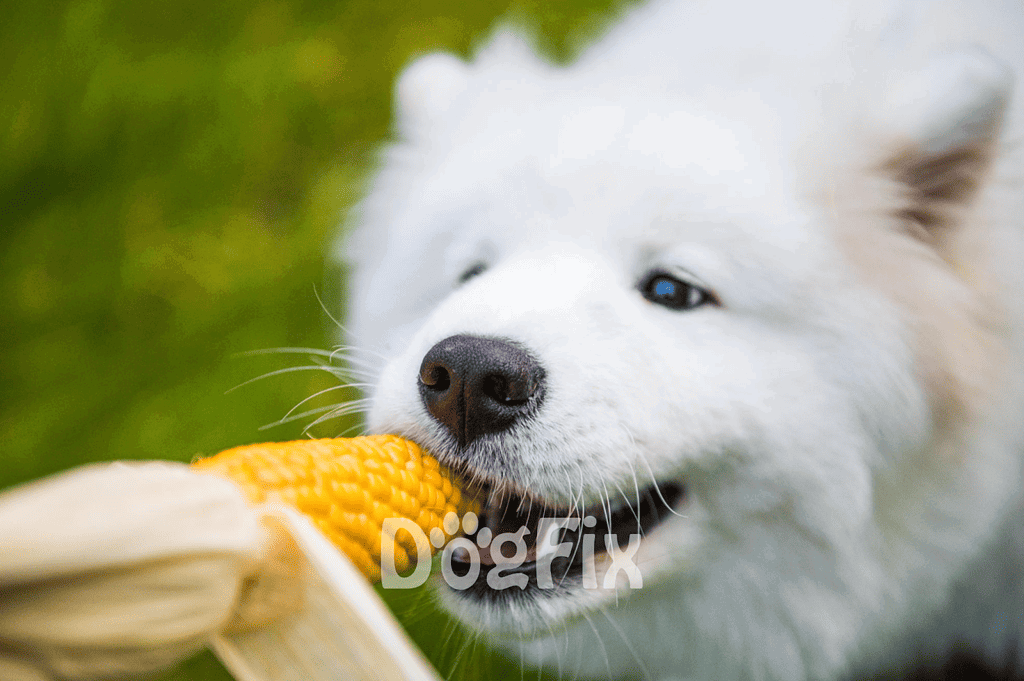
Hence, the ever-circling canine question: “Can dogs eat corn?”
Well, it’s kind of a mixed bag. Understanding whether our doggie friends can munch on corn requires a little bit of studying about its grain.
Here’s the scoop. Corn is a cereal grain, chock-full of carbs, protein, and fiber; it’s even in lots of dog food. But some dogs can’t handle corn and may have allergies. So, introduce it slowly and keep a watchful eye on your furball.
The Role Of Corn In Dog Food
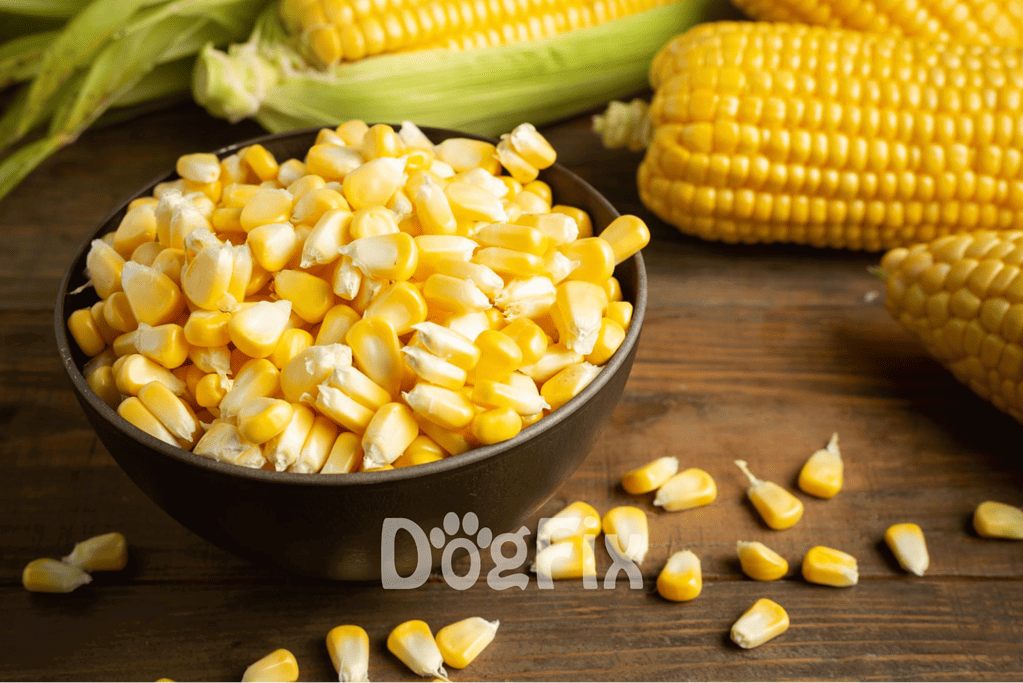
As it turns out, corn is quite a regular in many dog food formulas, pitching in some necessary carbs, proteins, and fibers. However, some people consider corn as a filler ingredient in dog food.
Is Corn Really Just A Filler?
Corn isn’t just a dog food filler; it packs sweet nutritional bonuses. It provides vital fatty acids for that soft skin and shiny coat and fiber for smoother digestion.
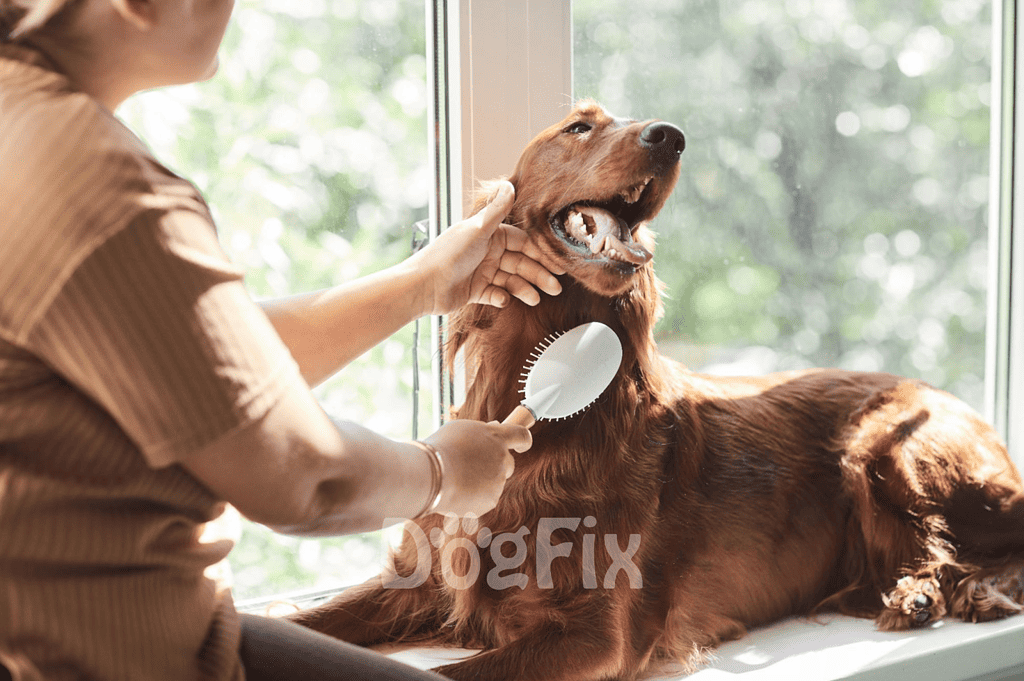
But hey, think of it like binging on pizza! Too much corn can lead to doggy weight gain and health woes. So, it’s all about the balance! And go for high-quality chow where corn complements, not dominates.
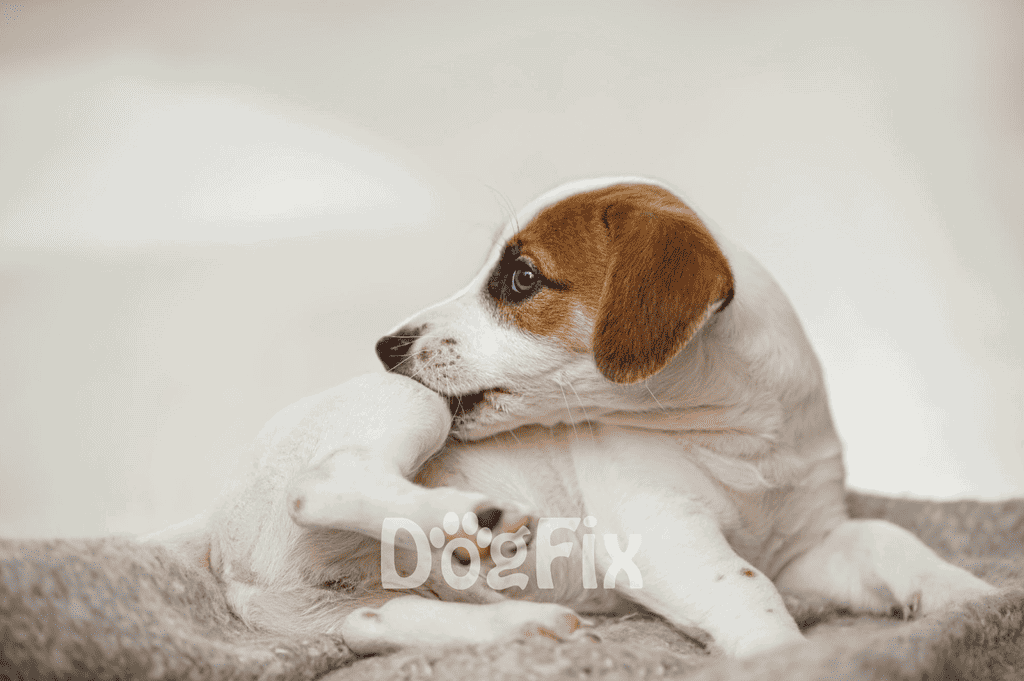
Just a heads up, dogs can have allergies, and corn might be a culprit. If your pup starts itching, goes red, or has a dodgy tummy after corn, it’s vet time. But generally, when sensibly used, corn can be a smart add-in to dog food.
What Good Does Corn Do For My Dog?
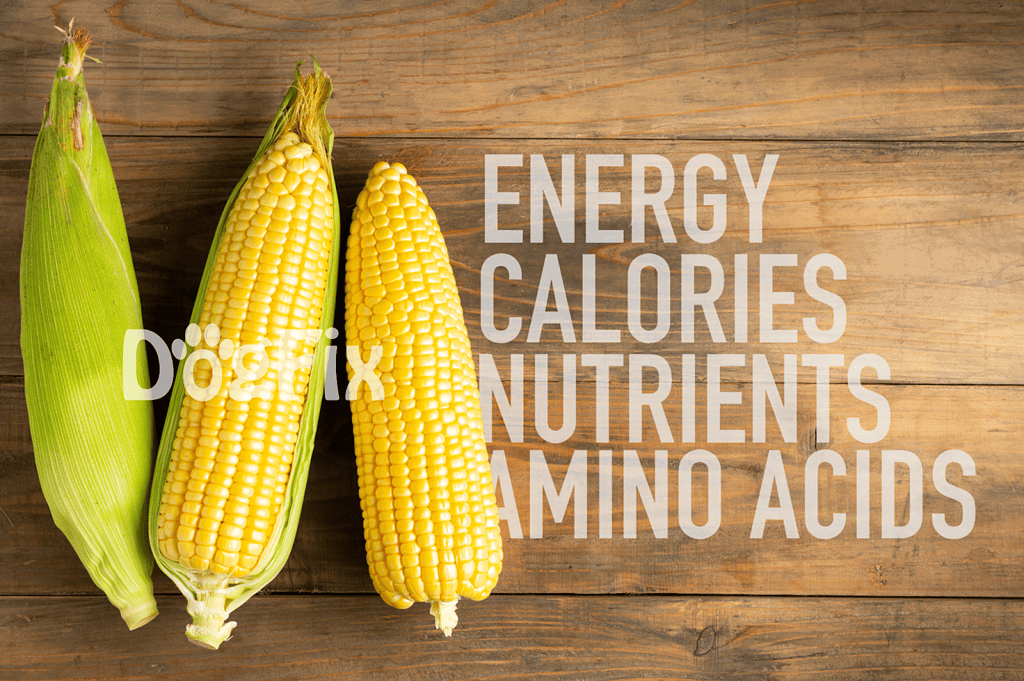
Let’s dig in and unwrap the goodies corn can offer our furballs.
Carbohydrates
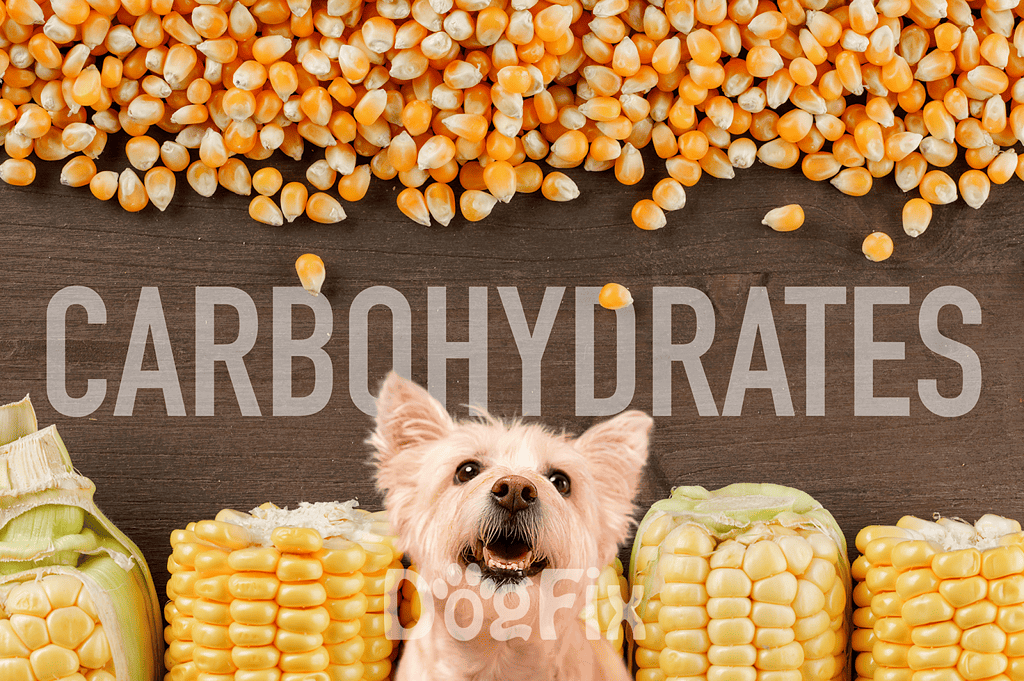
Corn is jam-packed with carbs, the MVPs of energy. So for all those pups who practically live by the motto “run, chase, rest, repeat,” corn is rocket fuel!
Calorie Content
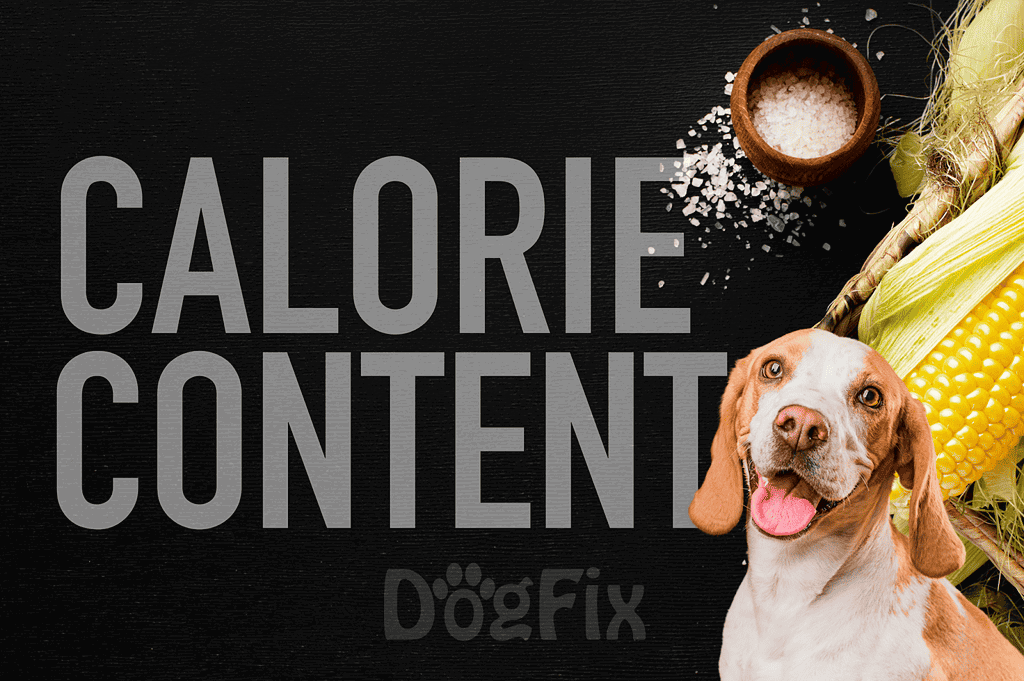
Now, corn’s pretty dense in calories. It’ll help keep your pooch’s weight on track, if it’s served in reasonable portions. Much like us with potato chips, overdoing it might turn Fido a tad plump.
Vitamins and Fatty Acids
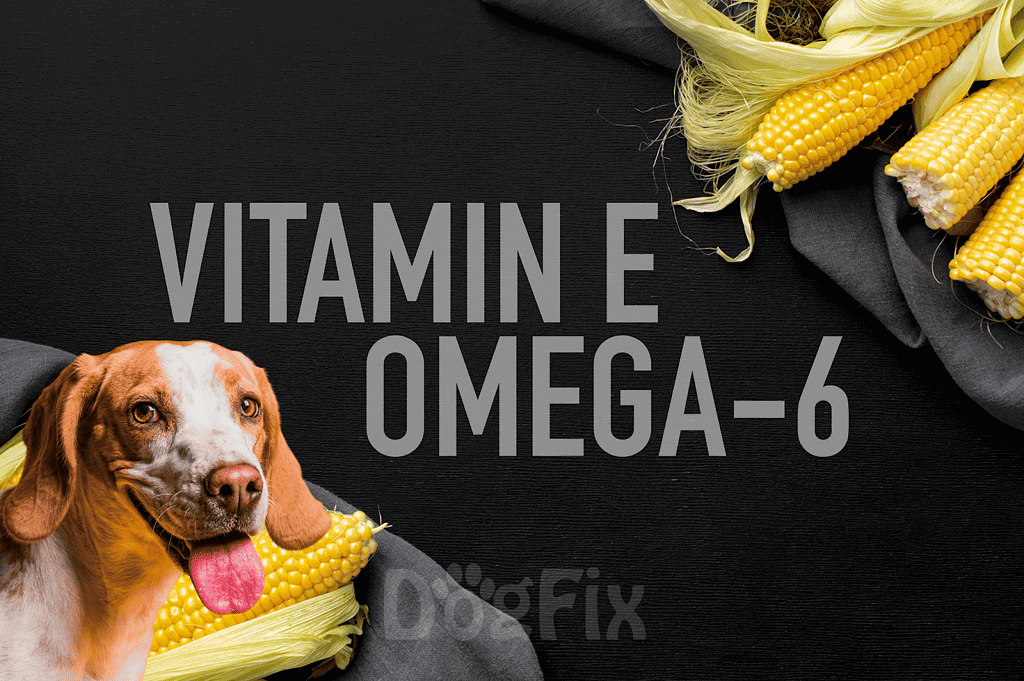
Corn’s got quite a few tricks inside its yellow shells. We’re talking vitamin E, your dog’s sneaky shield against illnesses, and Omega-6 fatty acids for shiny coats and healthy skin.
Amino Acids
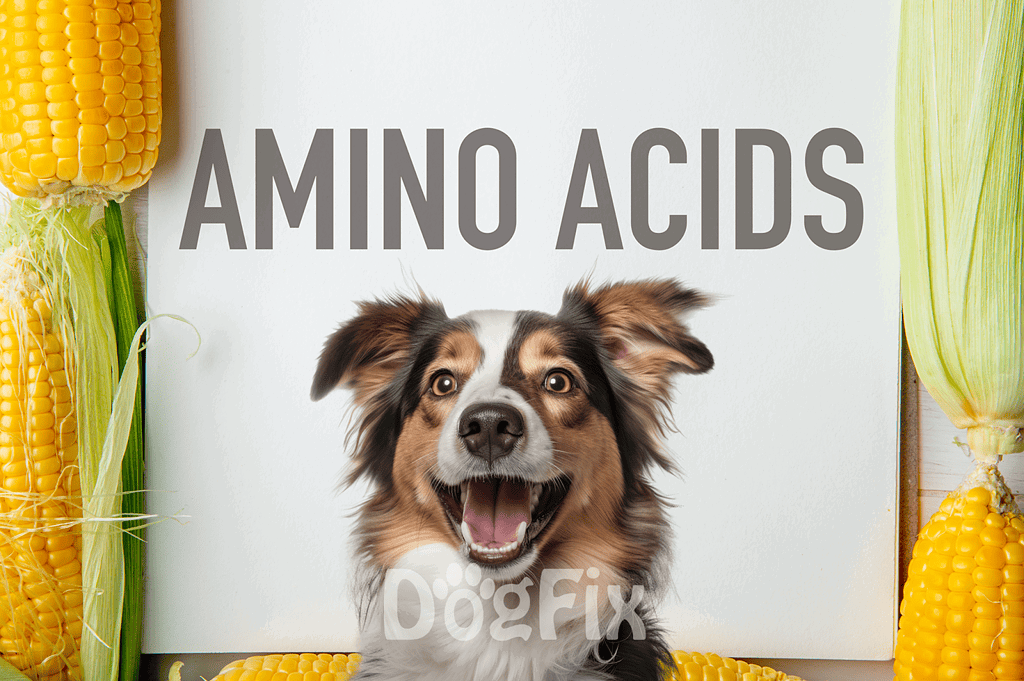
Corn also scores some points for packing in necessary amino acids –like lysine and tryptophan. These guys help in muscle repair, growth, and keeping your pooch’s brain function sharp.
Enjoying this read?
We publish this content for free to generate interest in our Premium members' area. By subscribing, you can ask the writer any questions related to pet care and this article, get access to 100+ Premium Pet Care Guides and go Ad-Free with DogFix Premium for $2.99.
Risks of Corn Consumption in Dogs
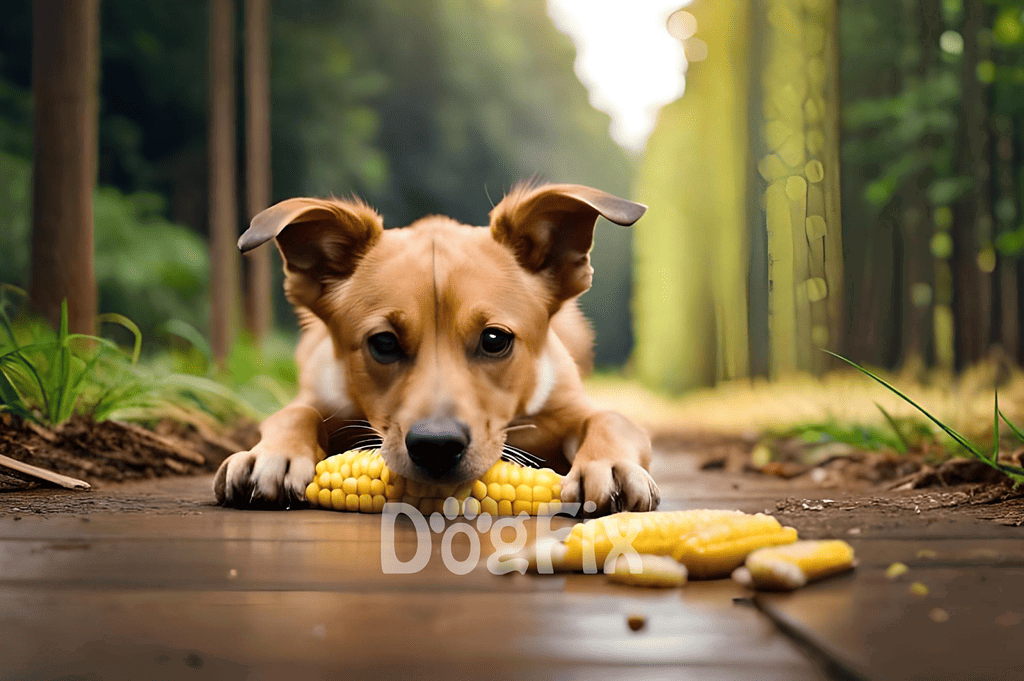
Ever had a brain freeze from a milkshake that’s just too good to sip slowly? Exactly! Corn has a few bumps too when it comes to our furballs.
Allergic Whoopsies
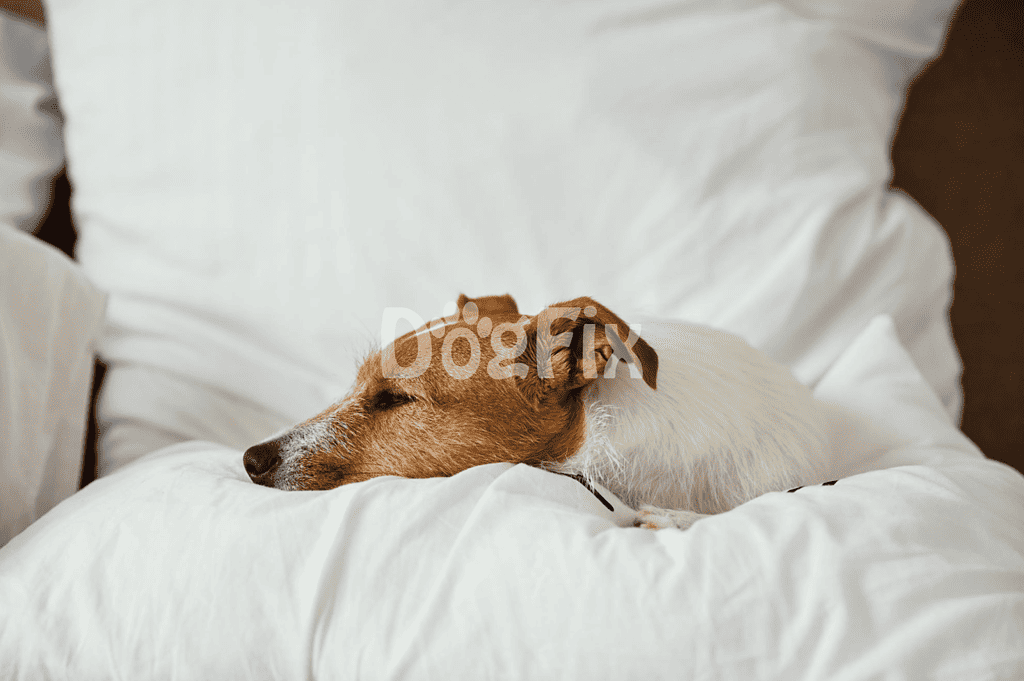
Some dogs might just pull a sneeze-fest or worse with corn. If they start getting barfy, sluggish, or upset-tummy-ish after a corny meal, it’s a red flag. Take corn off their menu and make a quick call to your vet.
The Choking Obstacle
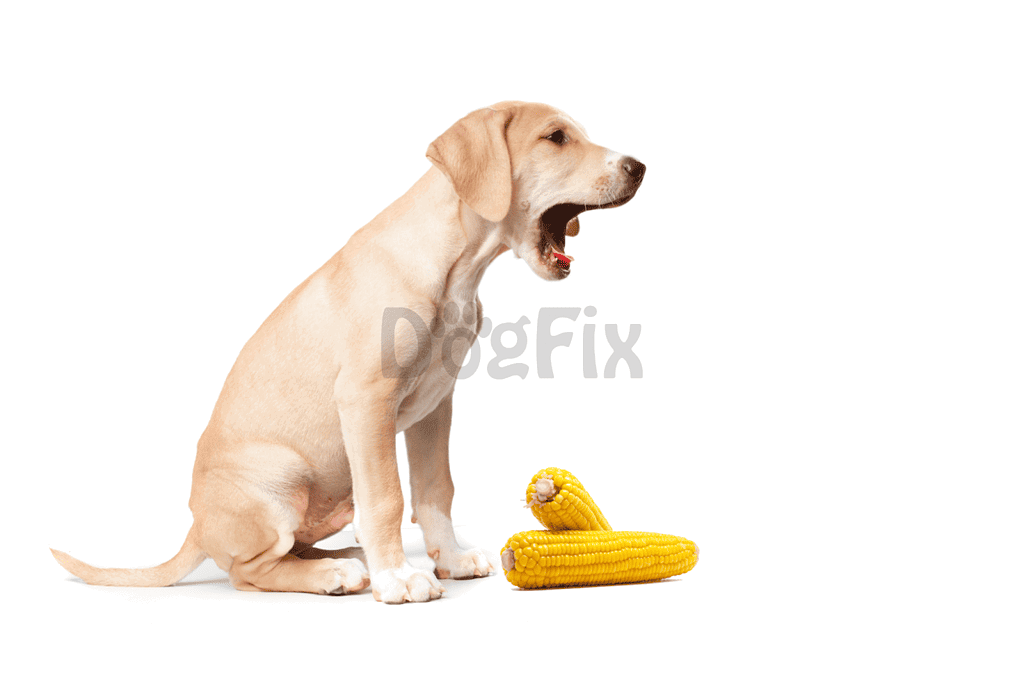
Remember how mom warned you about swallowing gum because it’d stick in your stomach? For dogs, swallowing a whole corn cob or husk can cause trouble like choking or intestinal blockage.
Spot weird signs like vomiting or tiredness? It’s vet time, pronto!
Tummy Troubles
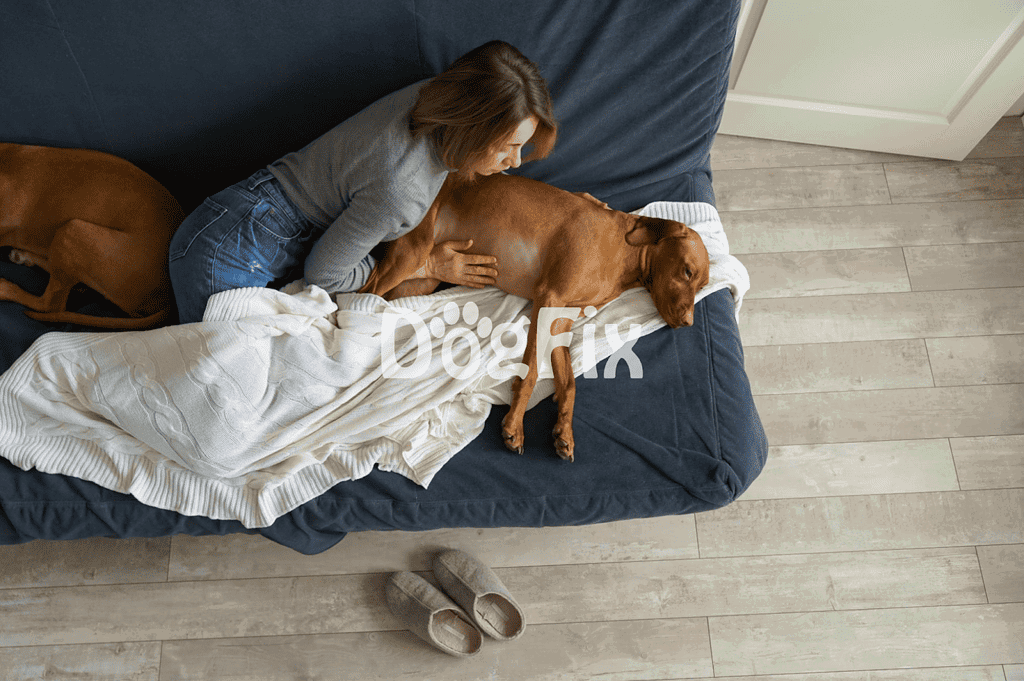
Not every doggie tummy is built for corn. It can be a bit heavy to digest for some, leading to an upset stomach and the other symptoms we’ve discussed.
Calorie Alert
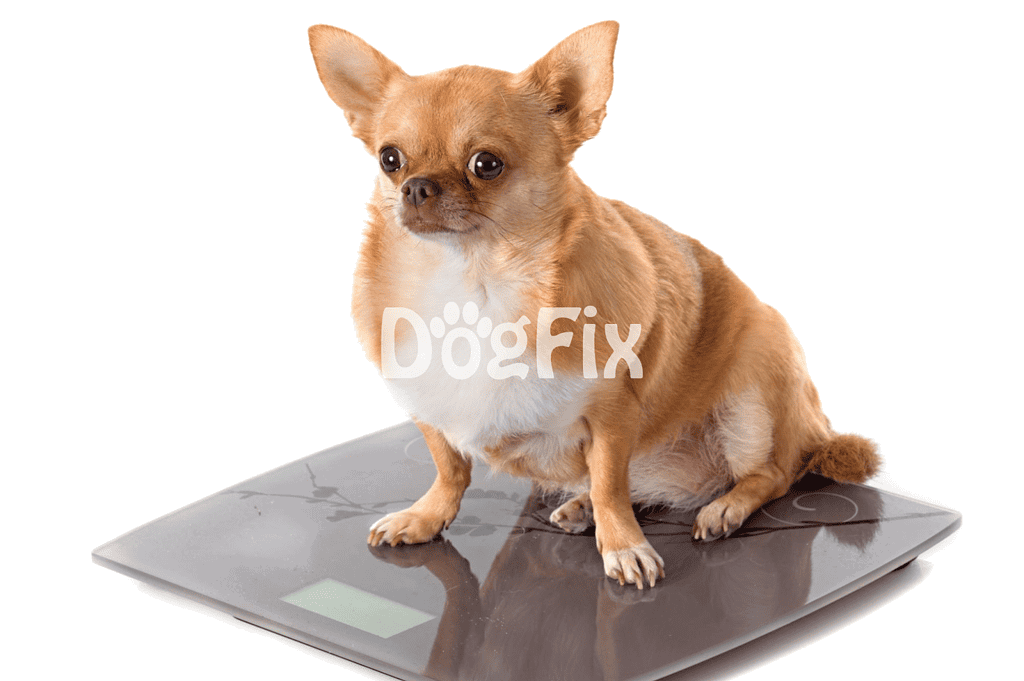
Corn’s high in calories and carbs, which sounds fun until you’re struggling to get your dog to fit into their collar. Monitor their corn intake to keep them lean and active, because nobody likes a sluggish pup.
Dangers of Excessive Corn in Dog Food
Sometimes, commercial dog food uses corn as a filler. This could tip their dietary balance off if there are insufficient other nutrients. Always read the label on your dog’s food and make sure it’s well-balanced and nutritious.
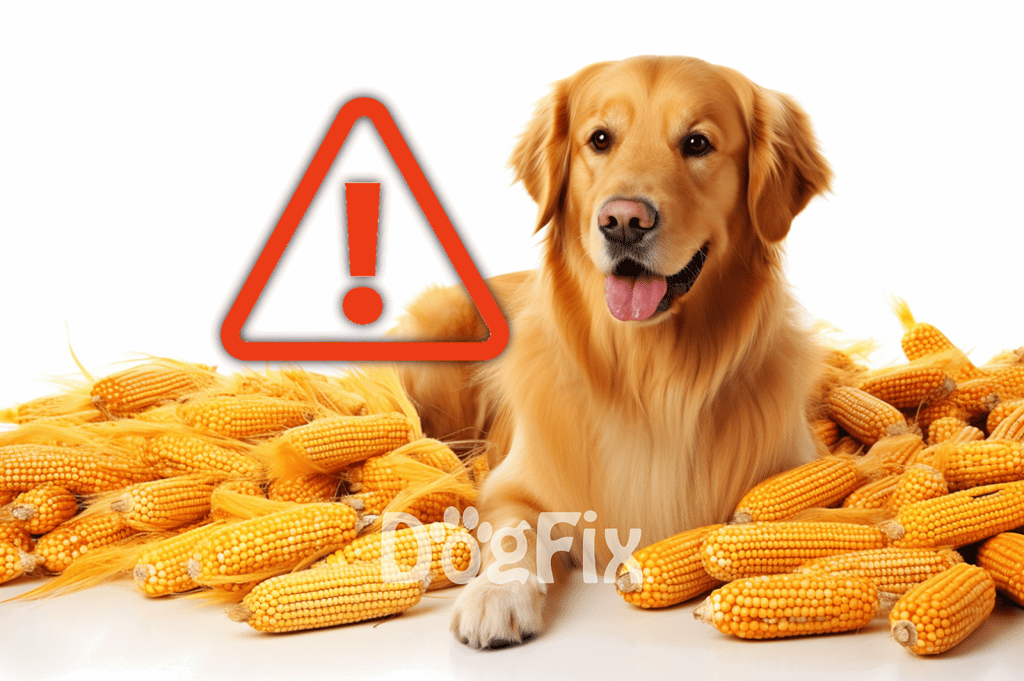
To sum it all up, corn can be a-okay for dogs, but too much of a good thing can land you in the vet’s office.
The Corn Catalogue: A Quick Guide For Dog Owners
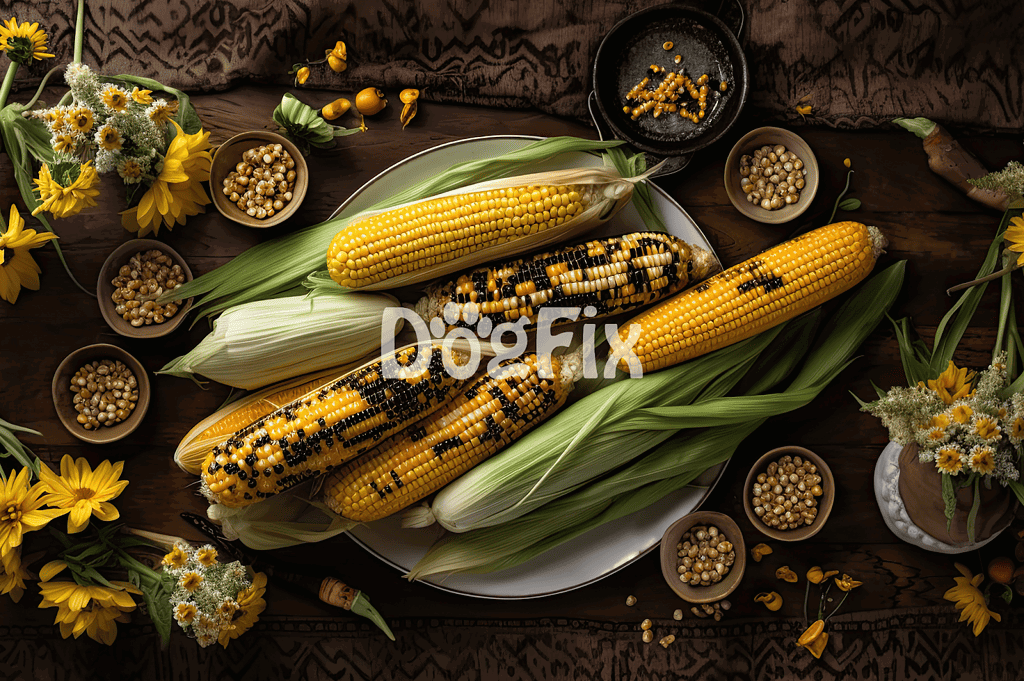
So, let’s talk about the different forms of corn and see what’s safe for your dog and what’s not.
Corn on the Cob
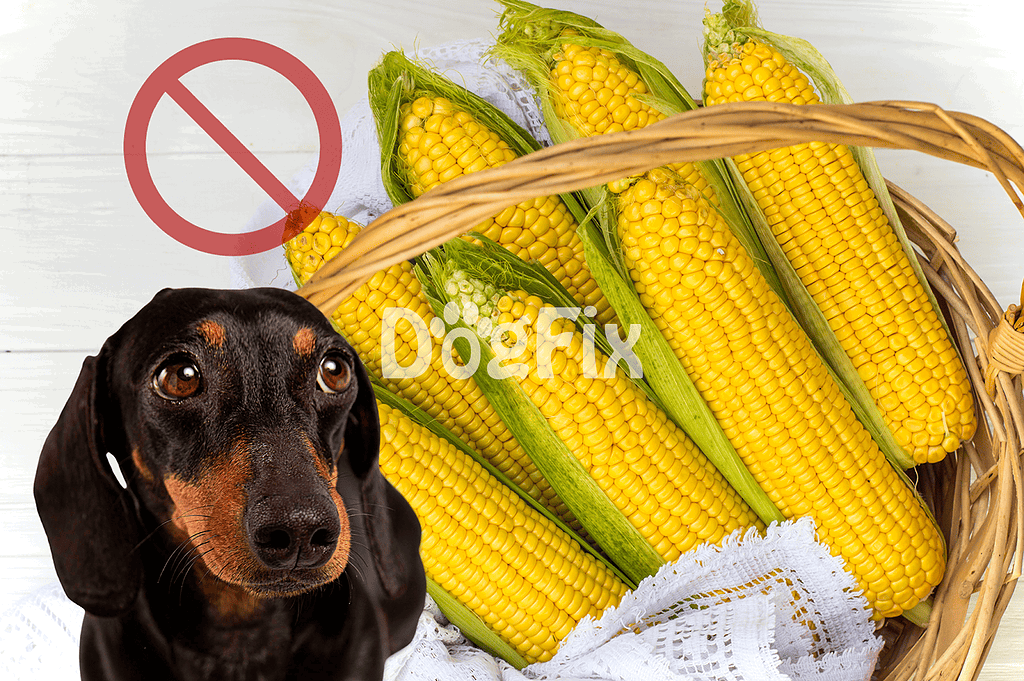
Perfect BBQ food for us, a big no-no for dogs. It might be amusing to see Biscuit munch on corn on the cob, but the choking risk might cause blockages in their digestive system.
Canned Corn
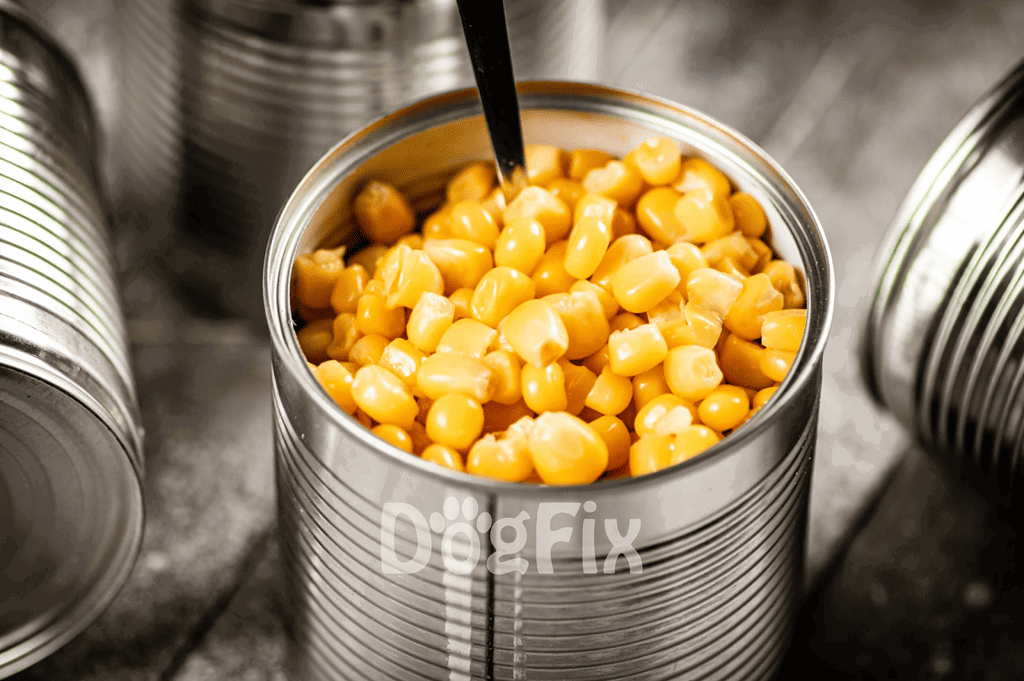
This one, sure, dogs can guzzle down canned corn. Just ensure it’s not the kind that comes with salt, sugar, or anything else.
Corn Kernels
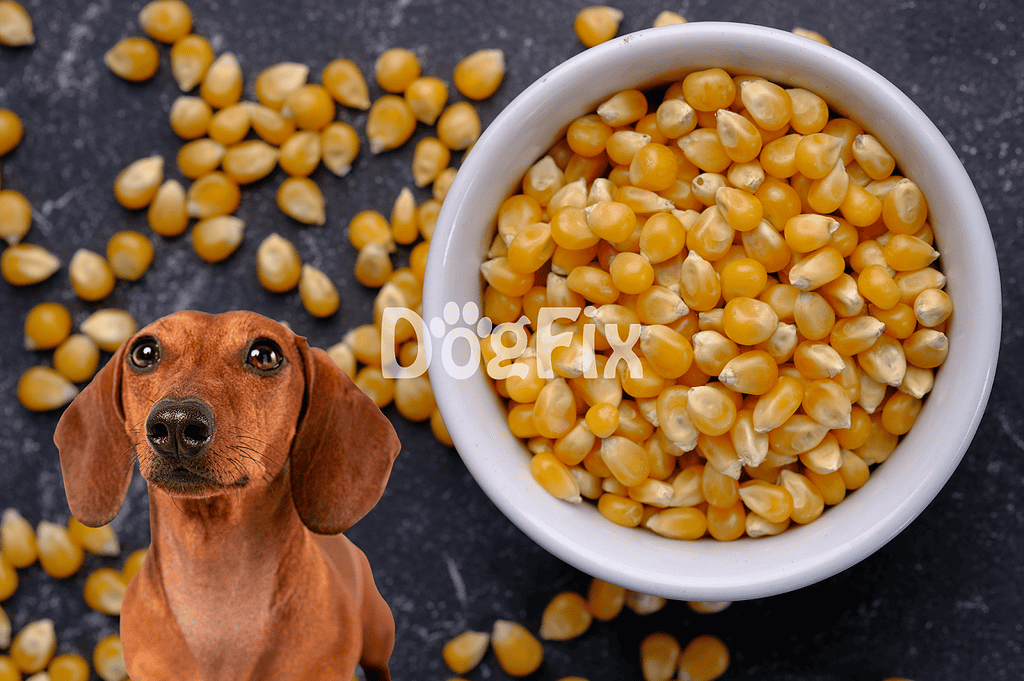
Your dog’s safe with corn kernels, as long as they’re off the cob and cooked. Raw kernels will have their stomach playing drums. On the other hand, cooked kernels can be a nutritious nibble for your furry buddy.
Sweet Corn
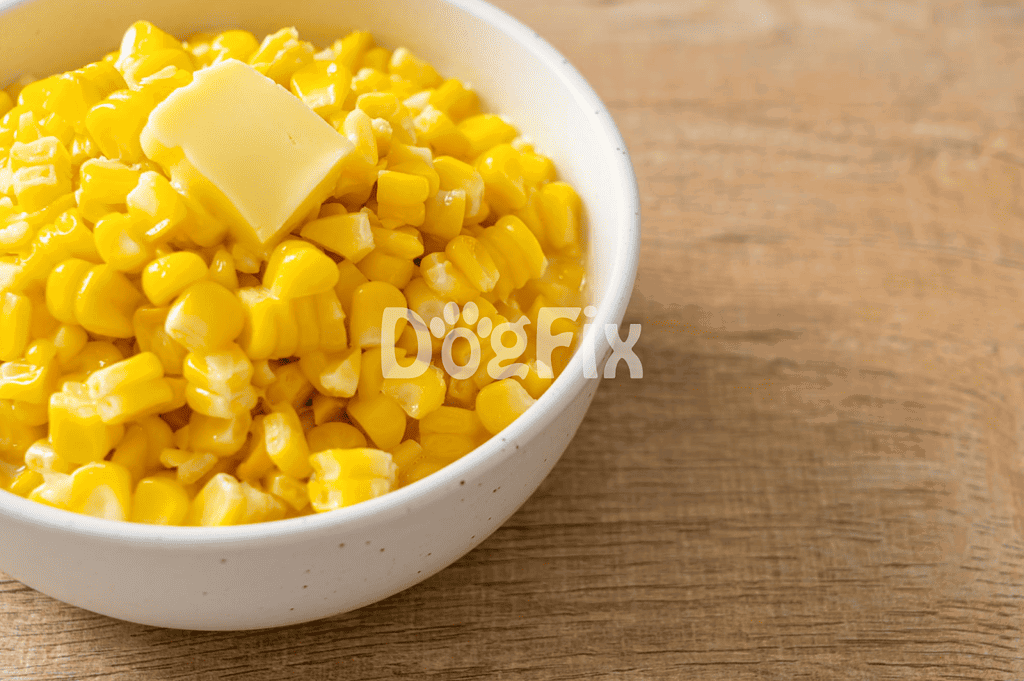
Now, this one’s tricky. It’s good for dogs, but don’t go overboard. Sweet corn comes with its sugar rush, which can be too “sweet” for your dog’s health.
Popcorn
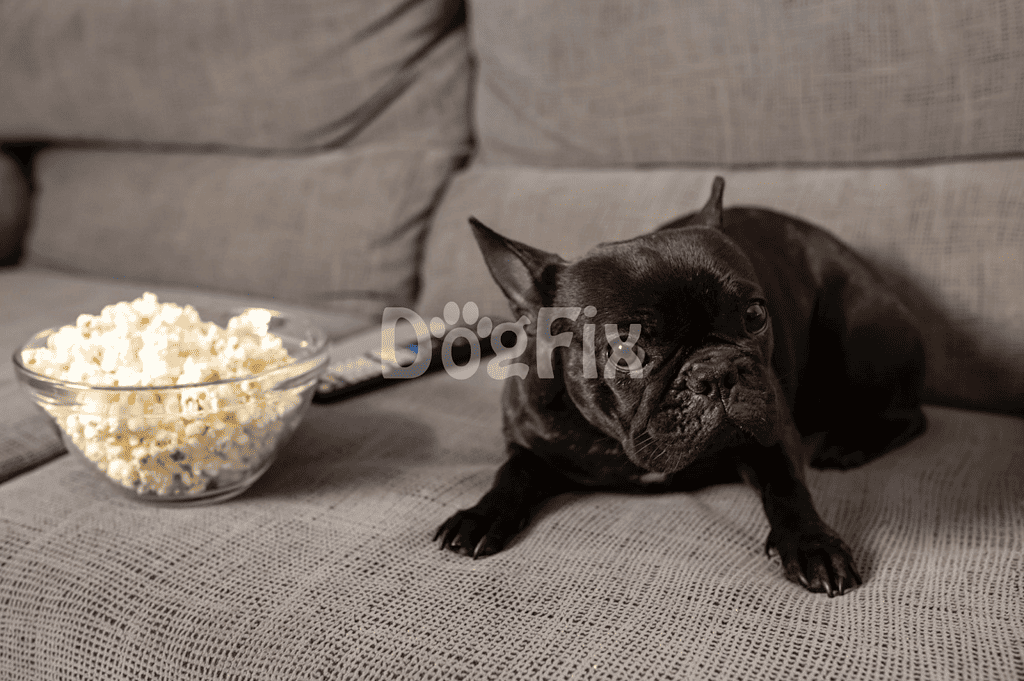
Popcorn that’s plain, air-popped, and sans butter, salt, or other additional flavors can be a cute treat, sparingly. Your pooch might enjoy the occasional popcorn crunch, just like us on movie nights.
Cooked Corn
Raw corn might seem convenient, but our furry friends like it cooked. Whether it’s boiled, steamed, or grilled, keep it bare – no salt or butter. Keep it plain, and your pup’s tummy will thank you.
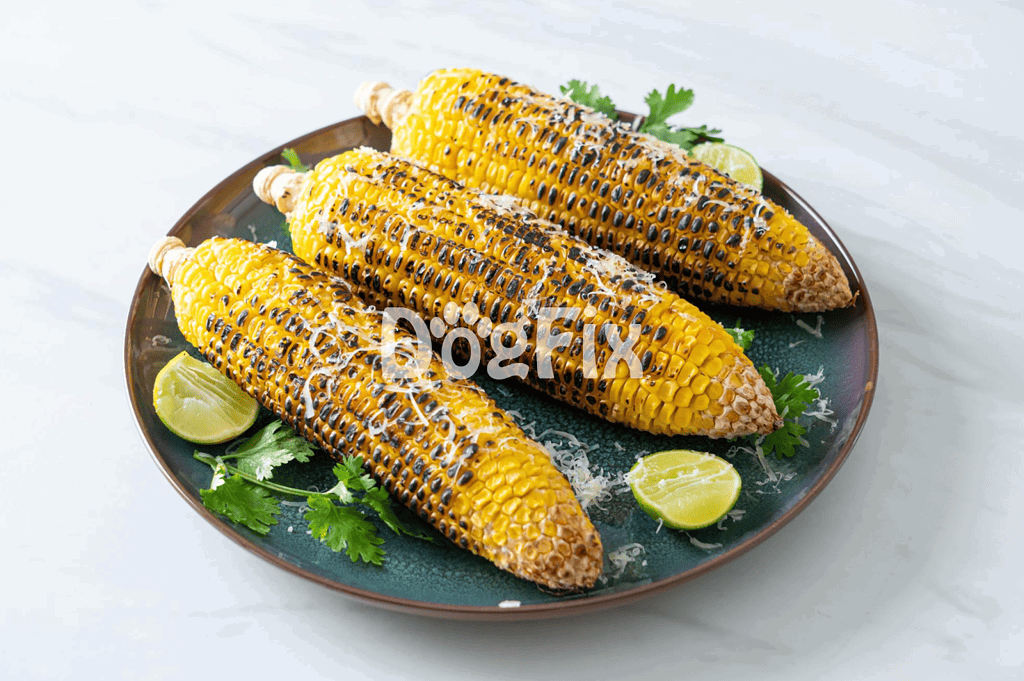
In a nutshell, corn’s awesome, but not all versions are dog-approved. So keep it simple. Go for cooked kernels or good old canned corn. Save the cobs for your BBQ and buttery popcorn for Netflix binges!
Corn Trouble? Ring Up The Vet
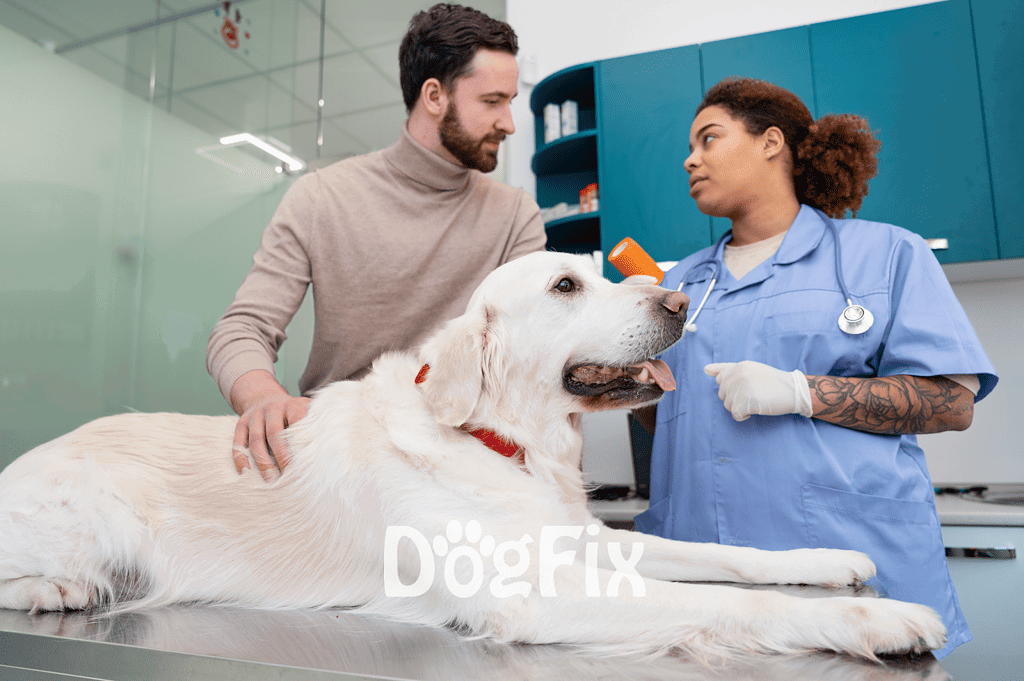
If your dog starts acting funky after a corn meal, it’s time to play it safe and buzz your veterinarian.
Unhappy Tummy
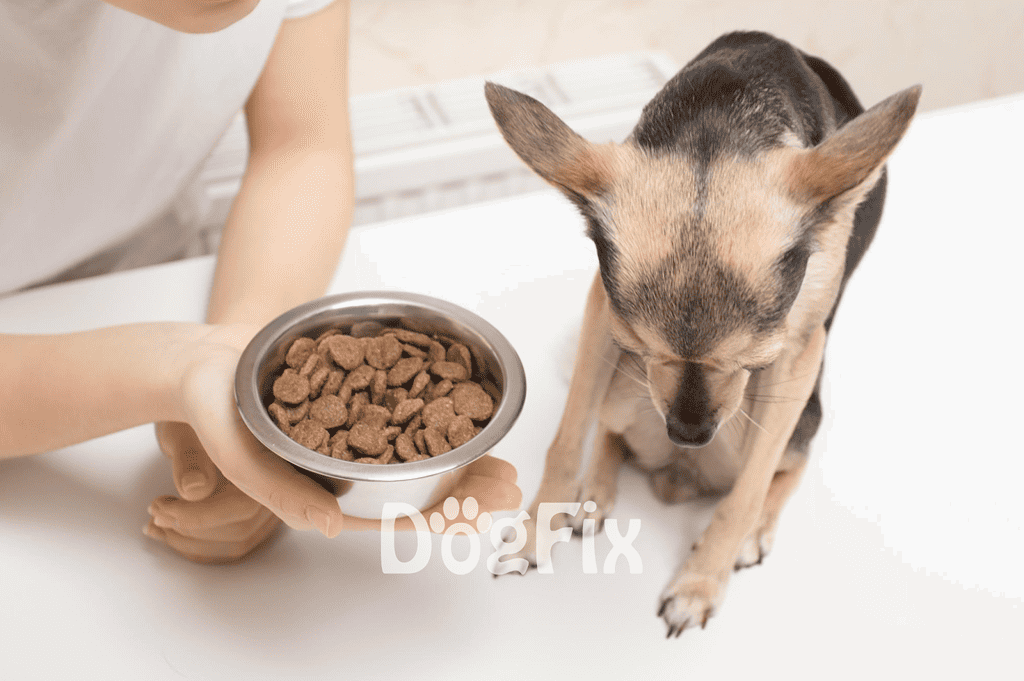
If your dog suddenly loses interest in his food, is vomiting, or has a ‘bathroom issue,’ it’s a cry for help. This could mean he’s allergic to corn, had some bad corn, or is incompatible with his new meal.
Surgery Scare

While we hope it never happens, swallowed corn cobs can block your pup’s tummy. In such cases, your vet might need to use X-rays or ultrasounds to spot the issue. In the worst-case scenario, it might even lead to surgery.
Gastro Issues
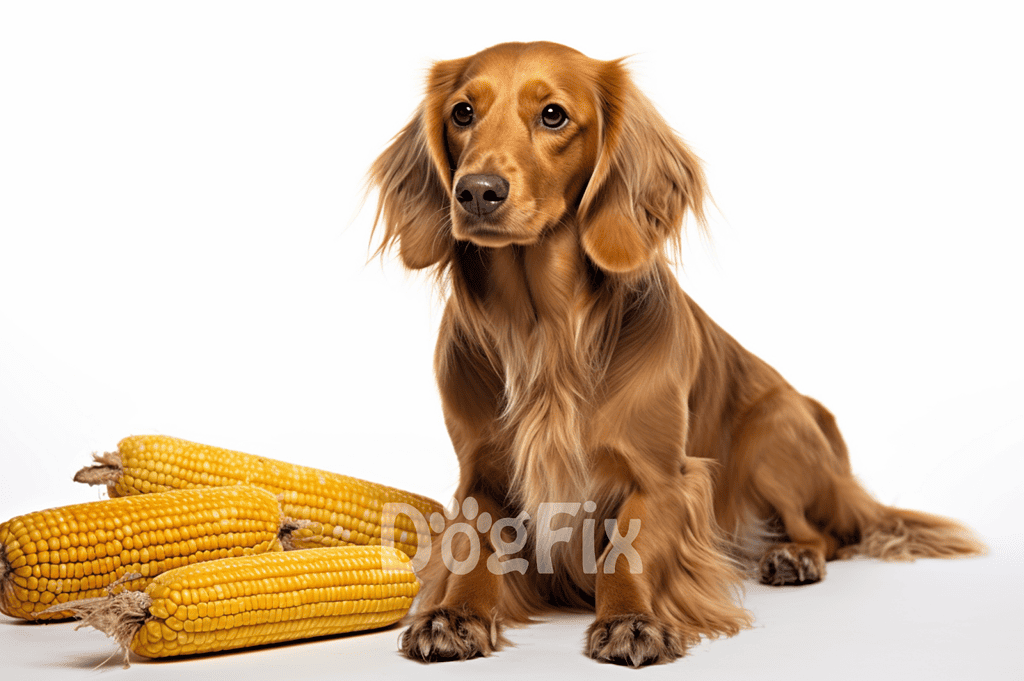
If your buddy has a history of digestive disorders or issues with food movement, it’s good practice to get your vet’s approval before introducing corn to their diet.
The “How much corn?” dilemma
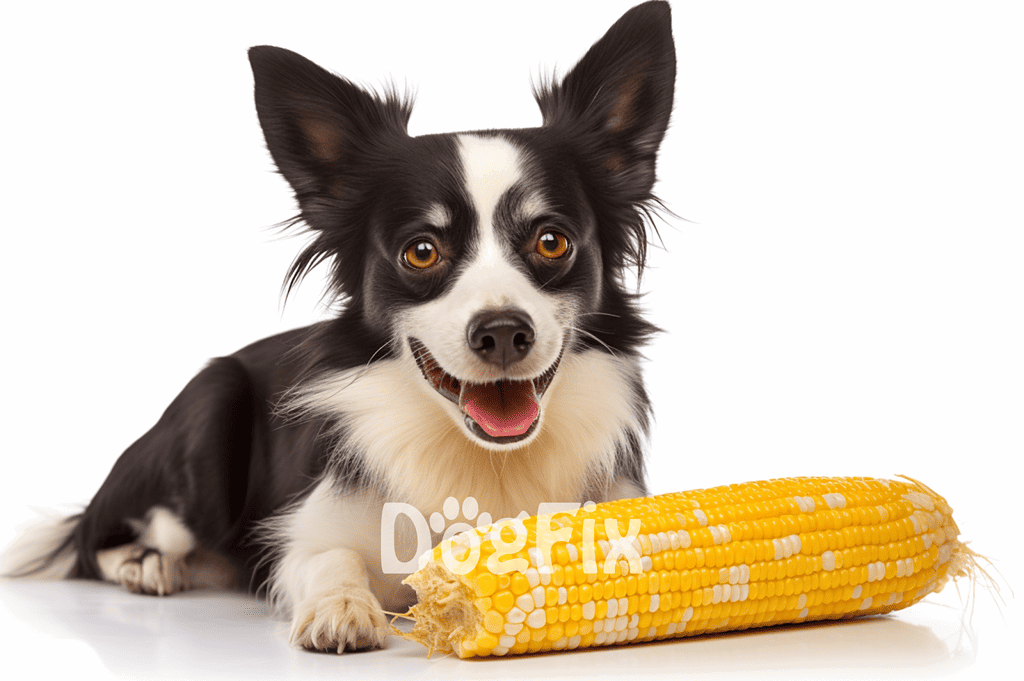
A dog’s diet needs to be balanced – it’s not just about nutrients but also proportions. So how much corn is too much? Your vet is the best guide for this.
Canned Corn Caution
Keep away from canned corn loaded with sodium and other unnecessary extras. Your vet can guide you about dog-friendly corn choices and cooking methods.
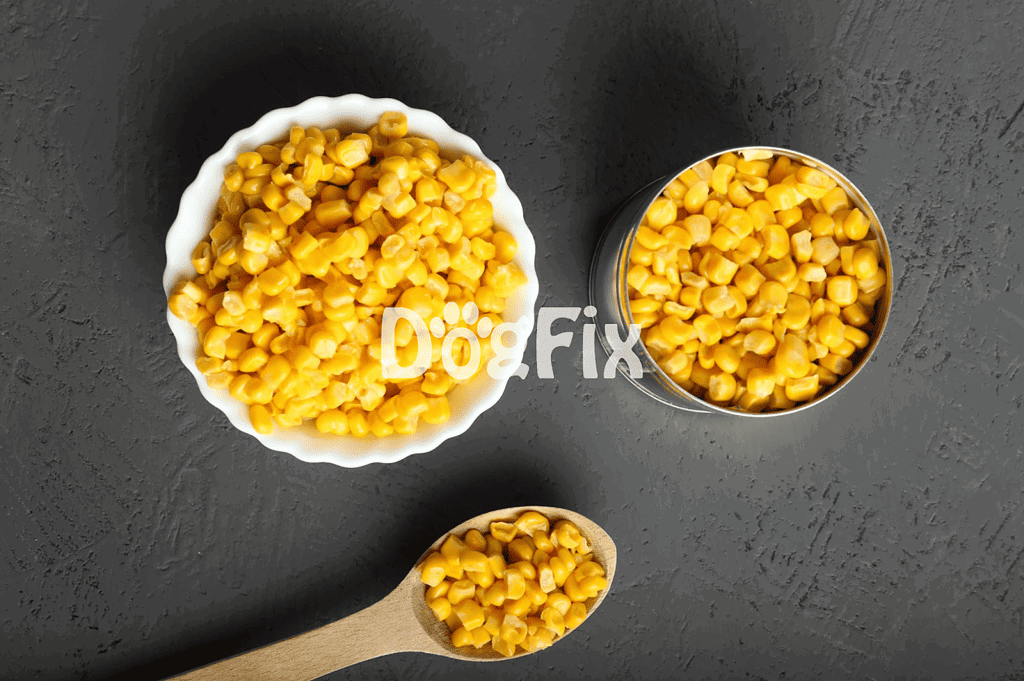
So the deal is pretty simple: if your dog starts feeling off after eating corn, contact your vet.
Corn & Dogs: Your Questions, Our Answers!
Can dogs munch on corn kernels?
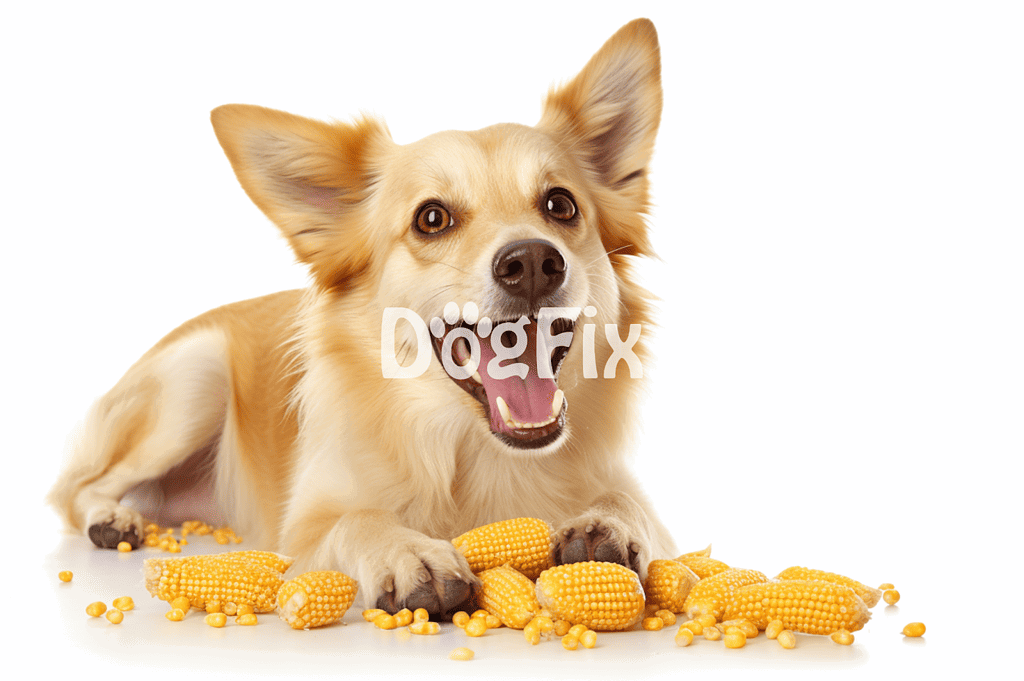
Totally! Cooked corn kernels are A-okay. Just keep it simple without any doggie villains like added salt or butter.
Cornbread for dogs. Yes or No?
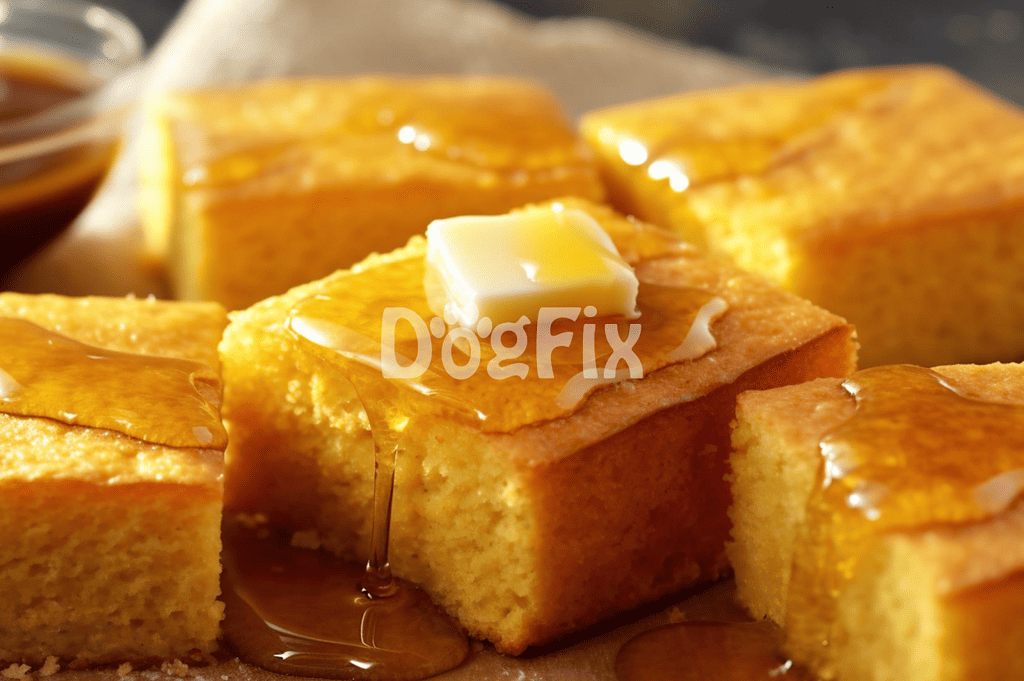
Let’s talk straight here. Cornbread contains sugar, salt, and unhealthy additives, making it a no-go for our pals. Plus, the texture isn’t their favorite either.
Can dogs handle cooked corn?
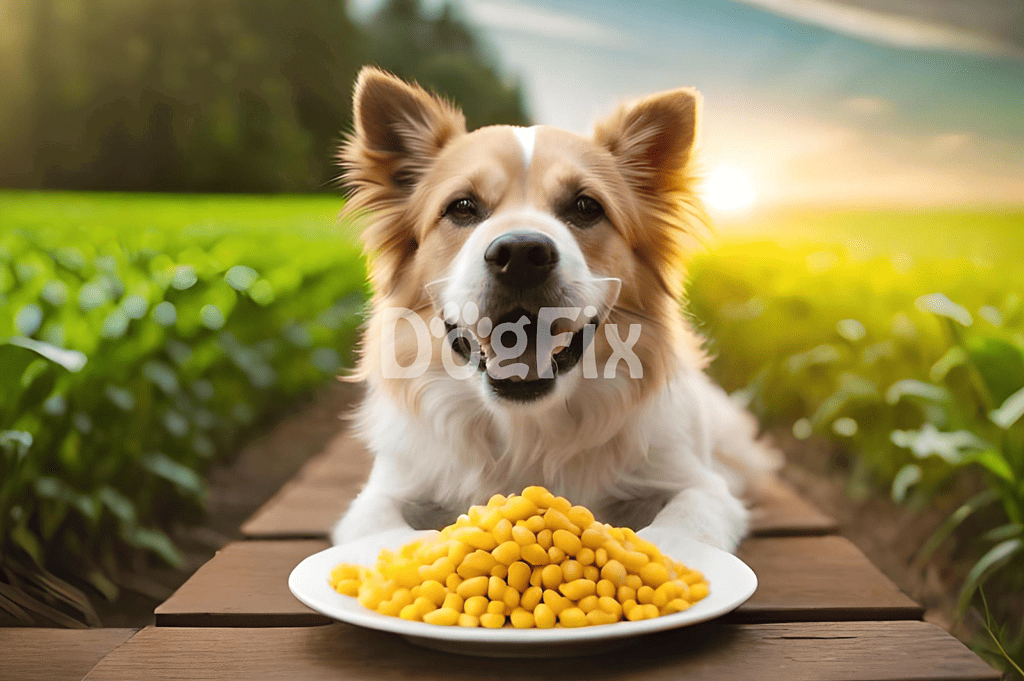
Yep, cooked corn is puppy-approved. Dodge the extra seasonings, though. The simpler, the better.
And what’s the deal with canned corn?
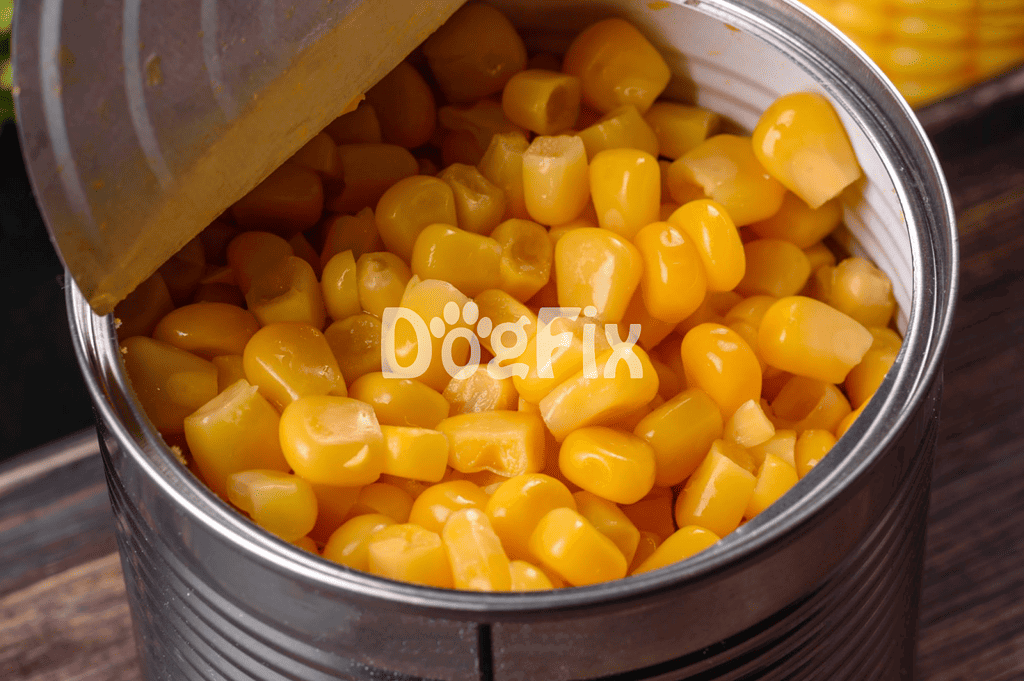
Not always the best choice for Spot. Why? It can sometimes contain too much sodium. And we all know too much of that salty stuff? Not good for our pooches. So exercise caution and read the label.
What is corn’s role in dog food?
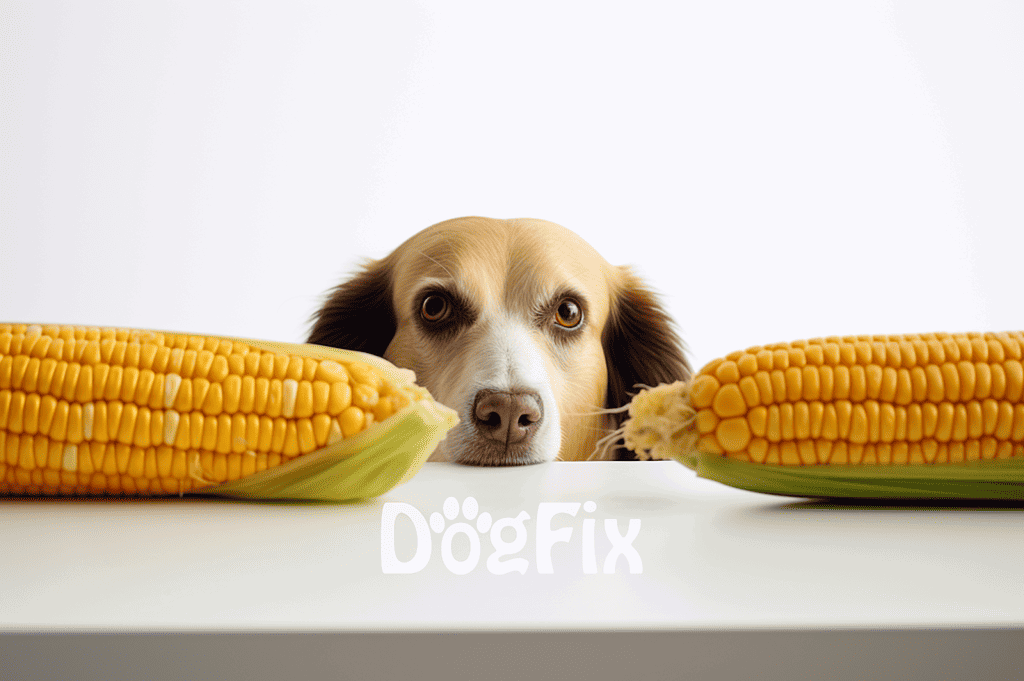
Corn is often used as the cheap kid on the block in dog food. Though it is fine in itself, some dog foods pulp up their offering with unnecessary amounts of corn, so always check the ingredients and their proportions.
Quick Recap on Corn And Dogs
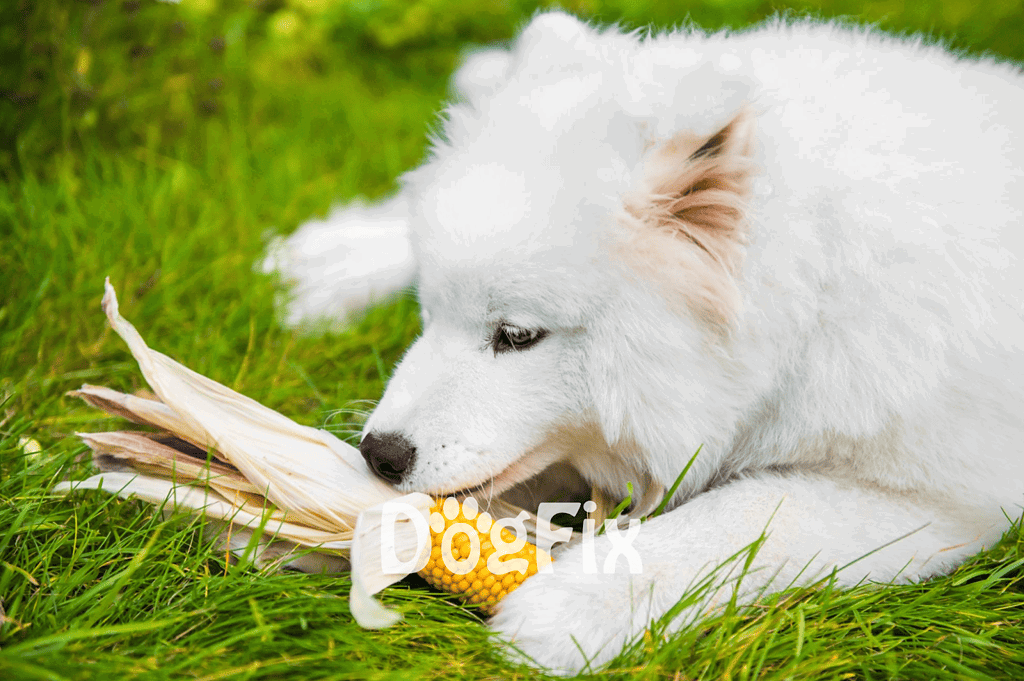
- Corn could be a great addition to your dog’s bowl, just remember to play it cool – start slow and watch their reaction.
- Corn on the cob and dogs? Nope! They might land your furry friend in serious tummy trouble.
- If your buddy’s tail isn’t wagging at the sight of corn, or you have concerns, ring up the vet.
